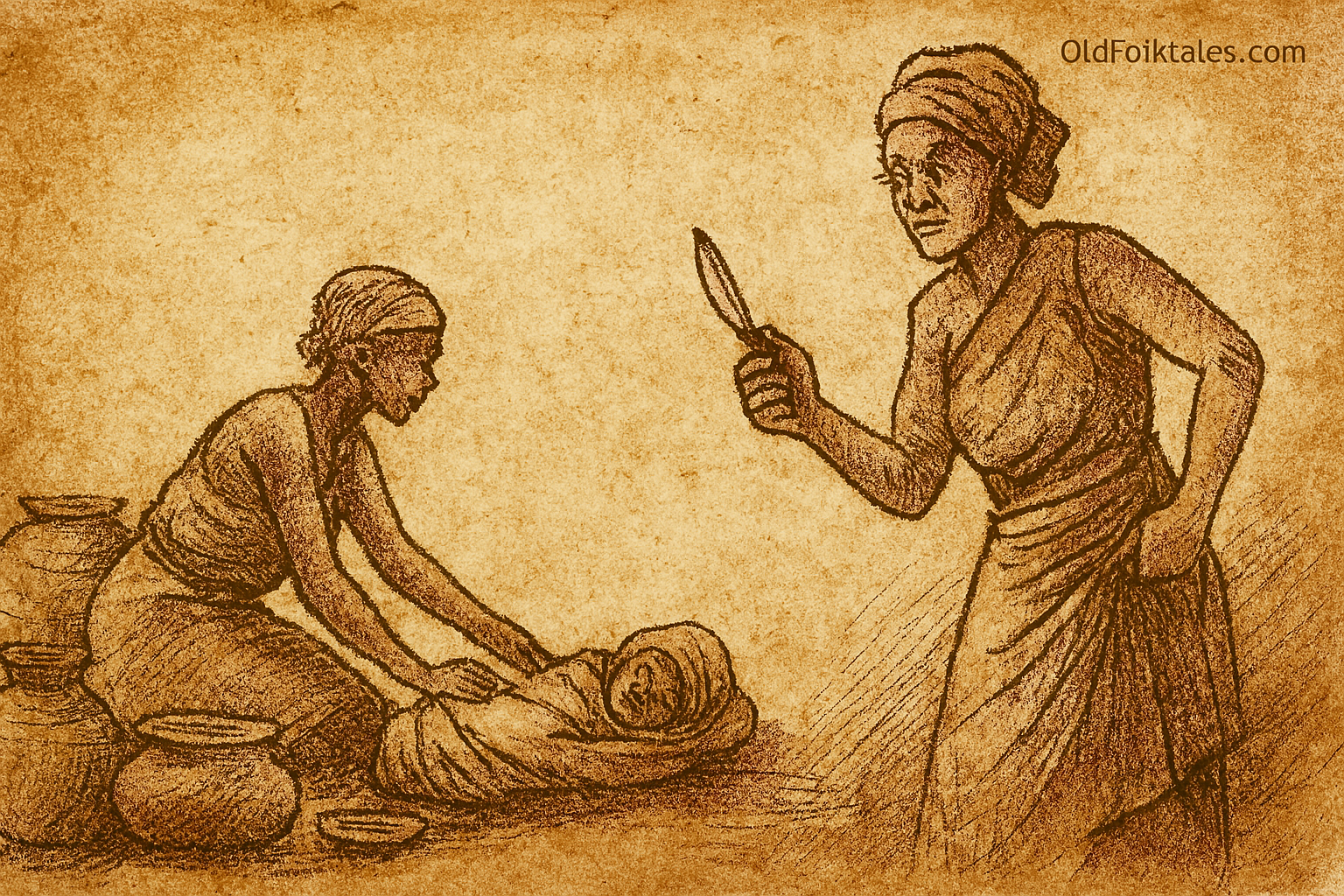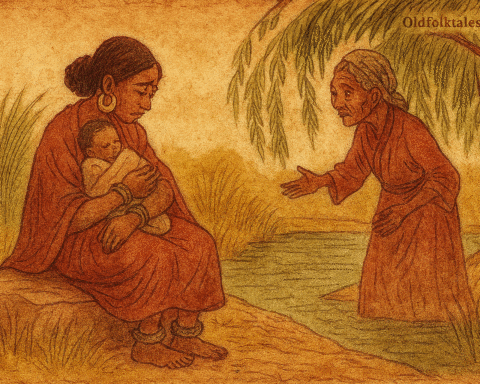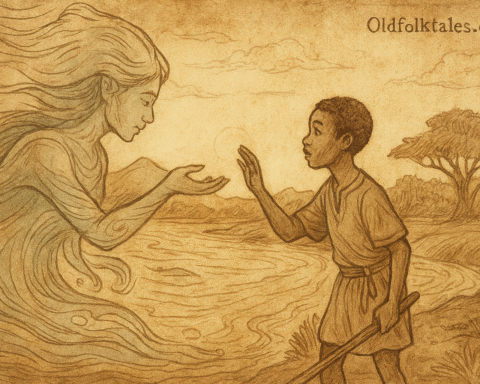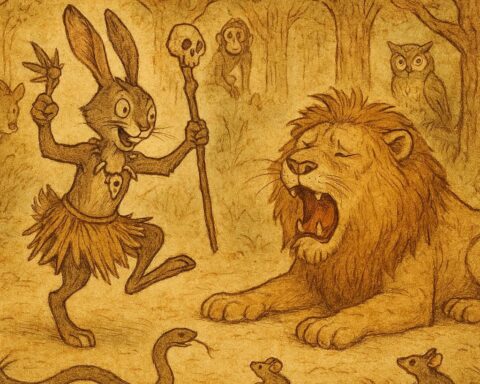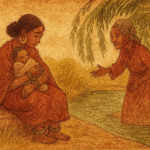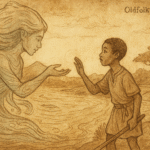In a village where polygamy was the custom and co-wives shared the duties of household and family; two women prepared for their husband’s long absence. With practiced hands, they worked side by side, kneading and shaping chicoanga, the native bread that would sustain their husband during their six-month trading journey into the bush.
Each woman had borne their husband a child, and these little ones played nearby as their mothers worked. The husband, a trader who ventured deep into the wilderness to exchange goods with distant communities, watched his wives and children with satisfaction. But as the day of his departure approached, concern shadowed his face.
“I am leaving you for many months,” he said, gathering both wives before him. “You must be very careful with the children. See that no harm comes to them while I am away.”
The women bowed their heads respectfully. “We promise,” they said in unison. “We will guard them as we guard our own lives.”
The husband nodded, shouldered his trading goods, and disappeared down the path that led into the vast green wilderness.
If you liked this story, see our Central African folktales collection
The Fishing Expedition
The months passed slowly. The women tended their gardens, cared for their children, and counted the days until their husband’s return. As the sixth month drew near, they began to prepare for his homecoming.
“Let us go and fish,” the younger wife suggested one morning. “We should give our husband good food when he returns something special to welcome him home.”
The elder wife agreed, but a problem immediately presented itself. They could not leave the children alone in the village. Someone had to stay with them while the other went to the fishing grounds.
“I will go first,” said the elder wife, and she gathered her nets and baskets.
She remained at the fishing ground for two or three days, catching fish and smoking them over slow fires so they would keep. When she returned with her catch, the younger wife prepared to take her turn.
“Watch the children carefully,” the younger wife said as she departed, never imagining what darkness lurked in her co-wife’s heart.
The Seeds of Jealousy
Alone with both children, the elder wife found herself consumed by a poisonous emotion she had tried to suppress for months. The child of the younger wife was bright and intelligent quick to learn, quick to smile, quick to understand. In contrast, her own child seemed slower, duller, less remarkable in every way.
The comparison ate at her like a slow-burning fire. Why should the younger wife be blessed with such a clever child while she, the elder and supposedly more important wife, had a child who was less impressive? The unfairness of it twisted in her mind until jealousy transformed into something far more dangerous murderous rage.
“I will get rid of that child,” she whispered to herself, her eyes hardening with terrible resolve. “While the mother is away, I will remove this source of my shame forever.”
She took a razor and sharpened it with meticulous care, testing it against the hairs on her arm. When it cut them cleanly, she was satisfied. She hid the razor away, waiting for darkness to fall.
The Terrible Mistake
Evening came, painting the sky in shades of orange and purple. The children ate their supper and, tired from their day of play, fell quickly into deep sleep. The elder wife sat by the fire, watching and waiting. When she was certain both children were sound asleep, she rose and moved silently to where the younger wife’s child always slept.
In the darkness, with only the dying embers of the fire providing dim light, she found the small form wrapped in cloth. Her hand trembled as she raised the razor, but jealousy had hardened her heart beyond mercy. She committed the terrible deed swiftly.
The other child her own child woke at the sound. In terror, the little one scrambled from the sleeping mat and ran out into the night, seeking refuge with a neighbor. The elder wife, breathing heavily from what she had done, returned to her own mat to wait for morning.
When dawn broke, painting the world in soft gray light, the elder wife rose to dispose of the body before the younger wife could return from fishing. But when she approached the small, still form and pulled back the cloth to look at the face, horror struck her like a physical blow.
The child lying dead before her was not the younger wife’s child. It was her own.
The Flight into Madness
The elder wife’s scream caught in her throat. How could this have happened? In the darkness, she had gone to the wrong sleeping place. The child she had murdered out of jealousy was her own beloved son.
Grief and horror overwhelmed her reason. She wept uncontrollably as she gathered the small body in her arms, wrapping it carefully in her cloth. Then, unable to face what she had done, unable to imagine the consequences, she fled. She ran into the woods, disappearing into the green depths like a wounded animal seeking a place to hide.
The Return and the Search
When the husband returned from his trading journey, tired but satisfied with his business, he immediately sensed something was wrong. His elder wife was nowhere to be seen.
“Where is she?” he demanded, looking from face to face.
The younger wife, who had returned from fishing to find chaos and horror, could only tell him what her own child had witnessed. “During the night, the elder wife killed her child,” she said, her voice trembling. “Then she ran away into the forest.”
The husband refused to believe such a story. His wife, a murderer? Impossible! He called upon his friends, the bushmen who had traveled with him on his trading expedition, to help search for her.
“She must be lost or injured,” he said. “We will find her and learn the truth.”
They combed the woods throughout the day, calling her name, but found no trace.
The Discovery
On the second day of searching, one of the bushmen ventured deeper into the forest. As he moved quietly through the trees, he heard something, a voice, singing a strange and mournful song.
He crept closer and hid behind a large tree. There, in a small clearing, sat the elder wife. In her arms was the small, wrapped bundle. She rocked it gently, constantly shaking it as if trying to wake a sleeping child.
Her voice rose and fell in a heartbreaking lullaby: “Are you always going to sleep like this? Why don’t you awake? Why don’t you talk? See! See! It is your mother that nurses you.”
The bushman’s heart filled with pity and dread. He recognized the madness of grief in her actions. He hurried back to his friend.
“I have found her,” he said quietly. “Come.”
Justice According to Custom
The husband and his companions approached silently, hiding themselves so the woman could not see them. They watched as she continued her futile nursing, singing her sad song to the child who would never wake.
The husband’s face hardened as understanding came to him. The story his younger wife had told was true, though twisted by the woman’s terrible mistake. She had indeed killed a child but her own, not her co-wife’s.
He called for the woman’s relatives, as custom demanded. Together, they entered the clearing and made her their prisoner. When they unwrapped the bundle and confirmed that the child had been murdered, the elders convened to determine justice.
According to the laws and customs of their people, they gave the woman casca, a powerful poison used in trials and executions. The poison took her life swiftly.
They burned her body according to tradition, and when only ashes remained, they scattered them to the wind. Thus, the jealous wife who had sought to destroy another’s child out of envy had instead destroyed her own child and ultimately herself.
The younger wife raised her bright, intelligent child alone, while the husband mourned the loss of both his elder wife and his son, victims of the most destructive of all emotions: jealousy.
The Moral Lesson
This sobering folktale warns us about the devastating consequences of jealousy and comparison. The elder wife’s envy of the younger wife’s child consumed her judgment until she was willing to commit murder. Her story teaches us that jealousy blinds us to reality, causes us to harm those we should love most, and ultimately destroys the person who harbors it. The tragic irony, that she killed her own child instead of her rival’s, illustrates how jealousy causes us to wound ourselves while attempting to harm others. The tale also reflects the traditional justice system, where serious crimes like murder were met with capital punishment. Most importantly, it reminds us that comparing ourselves to others and coveting what they have leads only to tragedy. True peace comes from accepting and nurturing what we have been given, rather than destroying what others possess.
Knowledge Check
Q1: Why did the elder wife become jealous in this African folktale?
A: The elder wife became jealous because the younger wife’s child was much brighter and more intelligent than her own child. This comparison consumed her with envy and shame, making her feel inadequate as a mother. Her jealousy grew so intense that she decided to murder the younger wife’s child while the mother was away fishing.
Q2: What terrible mistake did the jealous wife make when attempting murder?
A: In the darkness of night, the elder wife went to the wrong sleeping place and killed her own child instead of the younger wife’s child. She had sharpened a razor and committed the murder while both children were asleep, but she could not see clearly in the dim light and targeted the wrong child.
Q3: What did the elder wife do after discovering her mistake?
A: After discovering she had killed her own child instead of her rival’s, the elder wife was overcome with horror and grief. She wrapped the child’s body in her cloth and fled into the woods, where she descended into madness. She was found days later rocking the dead child and singing to it as if trying to wake it up.
Q4: How did the bushman discover the missing wife in the forest?
A: One of the bushmen who was searching for the missing wife heard her singing in the forest. He hid and watched as she rocked the wrapped body of her dead child, singing a sad song asking why the child wouldn’t wake up or talk to her. He recognized this must be his friend’s wife and went to bring the husband to the location.
Q5: What is casca in this African folktale, and why was it used?
A: Casca was a powerful poison used in traditional African justice systems for trials and executions. After the woman’s relatives and community leaders confirmed that she had murdered her child, they gave her casca according to their laws and customs. The poison killed her as punishment for the crime of murder.
Q6: What does the burning and scattering of the ashes symbolize in this story?
A: The burning of the elder wife’s body and scattering of her ashes to the wind symbolizes complete erasure and the severity of her crime. In traditional African customs, this method of disposal represented the ultimate punishment, not only was she executed, but her physical remains were dispersed so that nothing of her remained. It served as both justice and a warning to others about the consequences of jealousy and murder.
Source: Central African folktale (Kongo people tradition)
